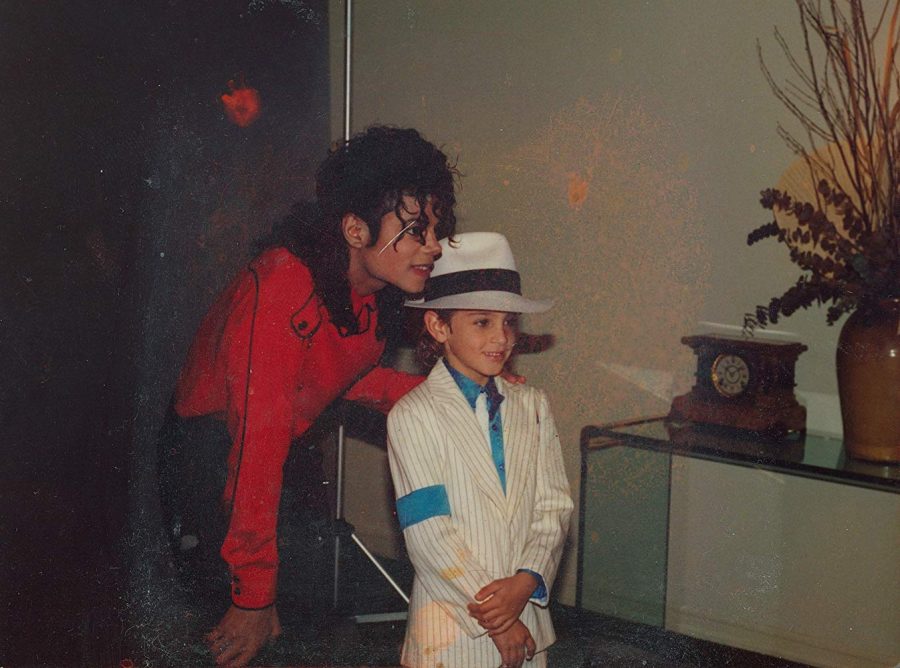Leaving Neverland Sheds Light on the Jackson Case
March 28, 2019
Most people know about the Michael Jackson controversy regarding his alleged abuse of children. The scandal has been the butt of any joke regarding Jackson since the details were first revealed back in the early ‘90s. However, the majority of his fans have never heard the personal stories of the accusers and what they claim to have been through, which is where the new HBO documentary Leaving Neverland comes into play.
From the very start, the documentary lets the audience know the focus is not on Jackson himself, but the two victims–Wade Robson and James Safechuck–who detail the story of their lives leading up to the alleged abuse and how it affected their families in the years following. It is easy to talk about the subject of this documentary without having seen it, for many have done so while swaying the public opinion towards the denial of these accusers’ stories. However, the only way for society to have an educated discussion regarding his guilt or innocence is if people actually watch this documentary and see for themselves what the rumors are about.
It didn’t take long for me to be certain these men and their families were telling the truth, for you can see it written all over their faces throughout the duration of this film. Many people have said these men are lying in order to get money from Jackson’s estate, and if they are then they are the best actors in the entire world. I don‘t know how people can watch Leaving Neverland while still believing these men are lying and that Jackson is completely guiltless in this scenario.
However, the reason this documentary rises above the fray regarding journalism of this kind is due to the angle director Dan Reed takes when telling this story. He doesn’t focus on Jackson’s life, his background, or any other factors that would cause the audience to sympathize with him or his situation. Reed did not make this movie as a Michael Jackson biography or exposé, but as a film that gives long overdue awareness for child abuse and how the abused are mentally affected. Even though the film makes it clear that Jackson is a famous pop artist, he is simply treated as the predator that changed the lives of his victims, and not the subject of his own story.
By reputation only, Leaving Neverland is an exposé that accuses Michael Jackson of various crimes, but in reality it a piece that brings light to the struggles of child abuse victims, and how the abuse stays with them throughout their lives. The abuse was not only physical but mental. Jackson manipulated the kids’ minds into thinking the sexual acts were for their benefit, and even had them fighting over each other in order to win his affections. The boys did not even think of the abuse as negative until 25 years later, which is when they first came out against Jackson to the public. Every facet of this widely known case is covered in excruciating detail, and all from the eyes of two men who will never fully recover from one man’s perverted way of expressing himself.
Never before has child abuse been portrayed in this truthful and personal a manner, which is why Leaving Neverland is one of the more important pieces of journalism in the past couple of years. The recognition that this issue deserves is long overdue, and the many victims of childhood sexual abuse that exist in society have needed a change regarding the stigma that has plagued them for so long. As stated in the epilogue to the film hosted by Oprah Winfrey, one in six men have experienced some kind of childhood sexual abuse, and more people like Wade Robson and James Safechuck exist than most people are willing to admit.
Leaving Neverland is an essential film for anybody that looked at the Jackson case and had even a slight doubt in their mind that the allegations were true; it is essential for those that do not realize the true magnitude of childhood sexual abuse all over the world; and it is paramount that more people support victims with similar stories in their community. This story does not stop at Michael Jackson: it is far broader. While not a perfect film (chronological issues near the beginning), anybody who is not aware and who can take in the graphic details should watch this movie and understand the mental stigmas that are unnecessarily applied to cases similar to this.








Phil Ad • Mar 30, 2019 at 9:32 pm
The stories in “Leaving Neverland” do not check out. Wade’s dinner story came AFTER and not before he testified. James story about sex in the train is off because the train was completed some years after the abused alleged started. There are many more inconsistencies. Plus, the two dudes changed their story like 4 times and were so ridiculous, that a judge threw out a lawsuit they filed after like 4 years of trying to get $1.5 billion from Michael’s estate. They perjured themselves to get past stature of limitation. So, why are you implying they are opening up new information and revealing Michael to be a pedo? There is even more, the documentary mirrors a book closely called “Michael Jackson was my lover”. It has things like blood in underwear, getting jewelry and other graphic sex stuff; just like the documentary. Guess what, the book is fictitious. You got played.